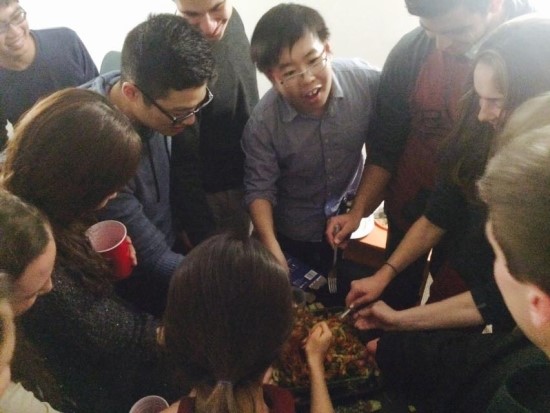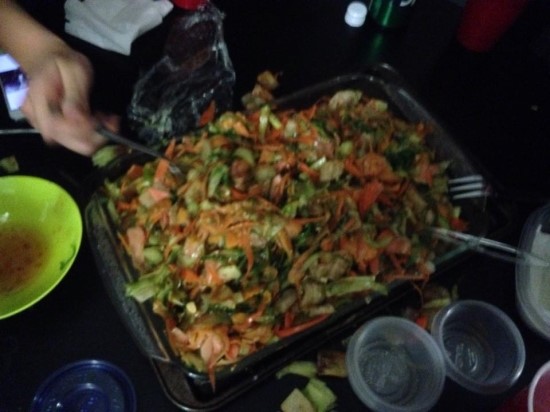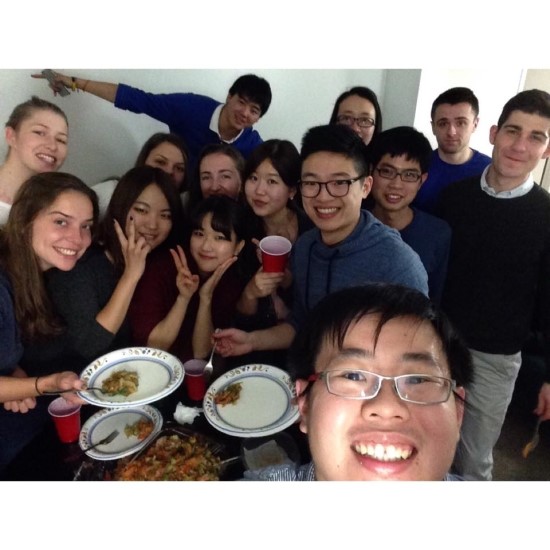By train1110
I’m writing this blog posting with deep gratitude to Wilson Koh, who organized the event, prepared and hosted the lunar New Year’s Day party in his dorm last week, on the 16th of February. (You’re awesome Wilson!! 🙂 )
 In Asia the use of lunar calendar had been dominant in the history, before modernization and adopting the Western solar calendar. For this reason, a lot of major national holidays are based on lunar calendar dates. New Year’s Day is one of those holidays, so nowadays Asians tend to celebrate New Year’s Day twice during the year, one on January 1st on solar calendar, the other on lunar calendar – of which the date is not on a set time in solar calendar. This year, the actual date for Lunar New Year’s Day was February 19th, but because it was the President’s day on 16th of February and everyone got a break from school that day, we decided to celebrate the Lunar New Year’s Day a little earlier than its actual date.
In Asia the use of lunar calendar had been dominant in the history, before modernization and adopting the Western solar calendar. For this reason, a lot of major national holidays are based on lunar calendar dates. New Year’s Day is one of those holidays, so nowadays Asians tend to celebrate New Year’s Day twice during the year, one on January 1st on solar calendar, the other on lunar calendar – of which the date is not on a set time in solar calendar. This year, the actual date for Lunar New Year’s Day was February 19th, but because it was the President’s day on 16th of February and everyone got a break from school that day, we decided to celebrate the Lunar New Year’s Day a little earlier than its actual date.
On Lunar New Year’s Day, families including relatives all gather around, enjoy the time together, say New Year’s greetings to each other, eat and do customary, traditional things for the New Year’s Day. Such customs and traditions differ from country to country in Asia, though the idea of families coming together and spend time with each other seems to be basically the same. In Korea, on the New Year’s Day, we say greetings to each other, bow (in a traditional style) to our parents, wear traditional clothings called ‘hanbok’, eat New Year’s Day food (which is represented by ‘Ddeok-guk’, a rice cake soup carrying the meaning of getting a year older) and play some traditional games together. Love of family is the most important virtue on the Lunar New Year’s Day.
Here in DC, close friends are like our families, for as exchange students most of us came here alone, with families or relatives staying in our home country. Having a Lunar New Year’s Day party together meant a lot to us, not only in terms of sharing different cultures but most importantly, being thankful for each other’s presence as family-like friends, to whom we could rely upon and share feelings together in a foreign country.
 Wilson (who is from Singapore) was the host of this Lunar New Year’s Day dinner event, and asked me and my friends to join the cooking. He himself cooked a lot of dishes and the rest of us usually cooked and brought one or two dishes. All put on one table, the dinner was the congregation of Korean, Chinese, Japanese, Singaporian dishes. After the dinner, Wilson introduced a Singaporian custom of the New Year’s Day which is called yusheng (or lohei). Yusheng is the food Singaporians eat on the New Year’s Day with their family, and the ingredients they put in the food each has different meanings, such as luck, wealth, success, youth, happiness and so on. Every participant for this yusheng says out loud the words that signifies all such good remarks and blessings and together, mixes all the ingredients like salad using chopsticks. We shared the food afterwards. It was a fun and memorable event, and above all another new and energetic, friendly start of 2015!
Wilson (who is from Singapore) was the host of this Lunar New Year’s Day dinner event, and asked me and my friends to join the cooking. He himself cooked a lot of dishes and the rest of us usually cooked and brought one or two dishes. All put on one table, the dinner was the congregation of Korean, Chinese, Japanese, Singaporian dishes. After the dinner, Wilson introduced a Singaporian custom of the New Year’s Day which is called yusheng (or lohei). Yusheng is the food Singaporians eat on the New Year’s Day with their family, and the ingredients they put in the food each has different meanings, such as luck, wealth, success, youth, happiness and so on. Every participant for this yusheng says out loud the words that signifies all such good remarks and blessings and together, mixes all the ingredients like salad using chopsticks. We shared the food afterwards. It was a fun and memorable event, and above all another new and energetic, friendly start of 2015!

